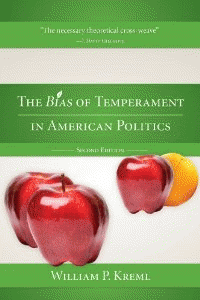If you are interested in the apparent sociopathic and authoritarian behavior of those who increasingly seem to control our major institutions, then you will want to read The Bias of Temperament in American Politics by William P. Kreml. What enchants me about this book is that it is written by a mainstream, heavyweight philosopher and political scientist who has been warning about unbalanced cognitions within institutions for decades.
The Bias of Temperament in American Politics outlines an original perspective on politics and how citizens look at politics that deals with cognitions, or how different citizens frame their understandings of politics. It suggests that there is a deep bias in American politics, a bias that favors the analytic, or apples to apples, form of understanding, and those who prefer that form of understanding, over the synthetic, or apples to oranges form of understanding and those who prefer the synthetic form.
The book grows out of what is known as Idealist thought, that largely German school of thinking that was eclipsed by the Materialists and those who, like Marx, believed that the mind was no longer the primary mover of history. Professor Kreml believes that Marx was wrong and that mind, not matter, is the primary mover of history, and that all kinds of human minds must be permitted to influence a politics that is both equitable and humane. In a world of giant governments and giant private sector institutions like the global corporation, as the citizen is increasingly unable to recognize, much less influence, the modes of thinking that were once (and still are) vital to the good health of Western civilization, the bias of temperament must be exposed, and corrected.
To maintain the necessary balances of forms of thinking, it is imperative, Kreml suggests, that the full range of human psychologies be permitted unrestricted access to any political system. Using Carl Jung's notions of the introverted and extroverted personality, the professor, in short, argues that the kinds of psychological discriminations that the noted social critic Barbara Ehrenreich has spoken to regarding the private, corporate world also exists within the public, governmental and political world. Creative thinkers, abstract thinkers, and those of a temperamental bent that favors the apples and oranges form of thought and that are necessary for the balancing of apples and apples thinking, are largely excluded from the American political world, just as certainly as African-Americans, women, the unpropertied, immigrants, and others were excluded from political access in earlier times.
As a result of the above temperamental bias, the American political system has slowly but relentlessly morphed into an aristocracy, on its way to becoming an oligarchy, as the Greek philosopher Aristotle understood those terms. The worsening gridlock of the American government, which Professor Kreml wrote about and spoke to publicly in brief, largely educational political campaigns many years ago, imperils our country today more than ever. The cognitive biases of the most centrifugal, or decentralized, government in the small "d" democratic world, along with the cognitive biases of the English common law education as it contrasts with the continental civil law education that few American politicians possess, weigh heavily on our country. We must correct those imbalances.
The Bias of Temperament in American Politics is bound to be controversial because in modern America Professor Kreml sees the institutional favoritism of particular subjective variables (authoritarian psychology and analytic cognitive preferences) as being more of an impediment to progress than the traditional institutional rejection of certain objective variables of race, gender, and class. Kreml has also long argued that government can become too decentralized (i.e., Undemocratic Decentralization) to the point where special interests pick off sections of the government and create niches within government to form oligarchy. The author's idea of good government involves a truly representative cross section of the people and their individual preferences. In many liberal and conservative circles, Professor Kreml's ideas will run contrary to prevailing dogma.
We need a heavyweight political philosophy-a modern Enlightenment-in order to create a contemporary, workable basis for a new kind of government. I believe Professor Kreml's ideas could serve in large measure as a cornerstone for a new constitutional framework. We're running out of time. If we the people don't act soon, especially considering recent revelations of surveillance and a quickly evolving police state, it may not be possible to change the government at all.
Part of positive change starts with philosophers and academia. The 17th and 18th centuries had Locke and the Enlightenment. In the 21st century we need something comparable.
Of course, the above brief summary in no way substitutes for the book itself. Professor Kreml packs thirty years of original research, knowledge, anecdotes, and prospective remedies into a diminutive 153 pages: a feat unto itself.





